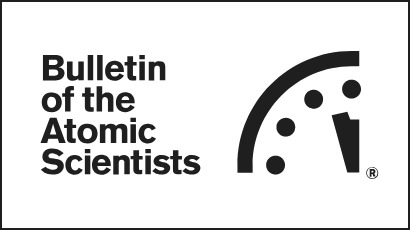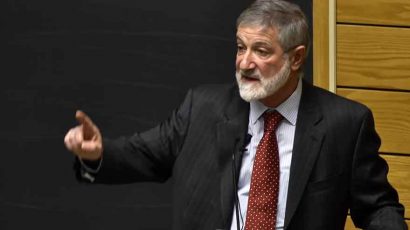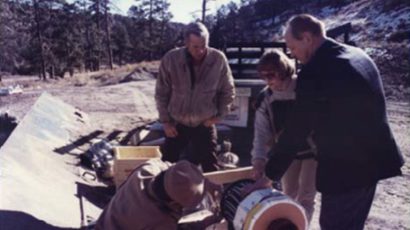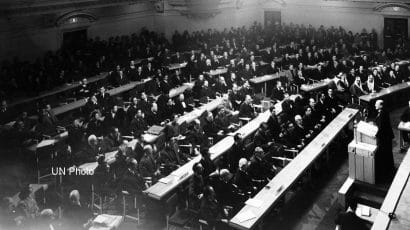Search results for
For decades now, India has obstinately resisted the idea of joining the Nuclear Non-Proliferation Treaty (NPT), claiming that the treaty is both flawed and discriminatory. Thus, India, a country with a nuclear weapons arsenal, has long stood outside of the nonproliferation regime. Yet recent government statements seem to indicate that New Delhi is rethinking its stance on the treaty--a very timely discussion, given the upcoming 2010 NPT Review Conference, at which reforming the treaty to reflect current security considerations is likely to be a topic of deliberation.
US-Iran: avoiding military confrontation
The source of tension is not Trump leaving the JCPOA, but rather the dangerously flawed nuclear deal itself and Iran’s ongoing nuclear weapons ambitions.
He helped found two groups that won the Nobel Peace Prize: Ira Helfand of PSR
His message is simple: Nuclear weapons are not a force of nature, and they are not an act of god. We have built these with our own hands, and we know how to take them apart.
When science brought Americans and Russians together
Working as partners, one-time enemy researchers made breakthroughs they couldn’t have achieved alone.
Could less be more?
The outcome of the 2012 Nuclear Security Summit left a lot to be desired, and much remains to be done to minimize the nuclear and radiological terrorism risk.
Blockchain beyond cryptocurrency: A revolution in information management and international security
Public attention on blockchain is currently centered on the erratic fluctuation of cryptocurrency, overshadowing other potential use-cases that can have significant impact on global security, including the tracking, accounting, and securing of sensitive assets such as nuclear material and facilities.
Running out of time
Editor’s note: The following memo was distributed to Dr. Hamre’s trustees and has been reprinted with permission. Colleagues, Please find Dr. Hamre’s most recent memo, attached here and pasted below. To: CSIS Board of Trustees, Advisers, and FriendsFrom: John J. HamreDate: December 6, 2017 (Number 453. Two pages.)Subject: Running out of time Last week I … Continued
Technical concerns: Why Russia worries about missile defense
Russia's Ministry of Defense held an unprecedented international conference in Moscow last week to explain "how NATO missile defense facilities … may affect Russia's forces of nuclear deterrence." Senior Russian military officials used the meeting, which included 200 participants from 50 countries, to publicly back President Vladimir Putin's decision to skip the NATO summit in Chicago later this mon
START follow-on: The Senate calculus
At long last, the United States and Russia are on the verge of signing a new treaty that reduces the countries' nuclear arsenals. The treaty, a follow-on to the landmark 1991 Strategic Arms Reduction Treaty (START), has been 95 percent complete for months, at least according to many U.S. and Russian officials, but disagreements over missile defense and verification procedures delayed the process. The result of these difficult negotiations will now face what could be equally tortuous consideration by the U.S. Senate.
Nonproliferation across the generations
A pioneer of nuclear nonproliferation passes on, but the work of nonproliferation must endure.
Dragons, thrones, and nukes, oh my.
Just what do those flying creatures represent in real life, anyway?
How likely is an existential catastrophe?
You’re far more likely to die in an existential catastrophe than you think. And the risk of such a catastrophe is growing.
Formulating the next U.S.-Russian arms control agreement
As the United States waits for a new administration to take office in January, expectations are high that arms control talks with Russia will be revitalized shortly thereafter. Parties in both countries--no matter political persuasion--think Washington and Moscow should move quickly to devise a new disarmament agreement that would replace the Strategic Arms Reduction Treaty (START), which expires in December 2009.
Bulletin of the Atomic Scientists: Call for submissions for Voices of Tomorrow
In 2013, the Bulletin of the Atomic Scientists will launch "Voices of Tomorrow," which will feature a monthly essay, op-ed article, or multimedia presentation written or produced by a high school student, college undergraduate, or graduate student. The topic must address some aspect of at least one of the Bulletin's core issues of nuclear weapons, nuclear energy, climate change, biosecurity, or emerging technologies.
Three myths about the Iran sanctions
Wrongheaded, fixed ideas have been plaguing the Iran negotiations
NATO and the future of missile defense in Europe
At its Lisbon summit in November, NATO is expected to make two important decisions: whether to build its own missile defense system in Europe and whether missile defense should be part of the alliance's core mission. Neither of these proposals has generated much controversy among the alliance members, so we can expect a reasonably strong commitment to missile defense to emerge from the summit.
1947: How the American people feel about the atomic bomb
A 1946 survey reveals Americans' views about the atomic bomb, who should control it, and whether there was any way to defend against it.
How can we reduce the risk of human extinction?
In the early morning of September 10, the Large Hadron Collider will be tested for the first time amid concern that the device could create a blackhole that will destroy the Earth. If you're reading this afterwards, the Earth survived. Still, the event provides an opportunity to reflect on the possibility of human extinction.
Taming antisatellite and space weapons
Before many of my readers were born, there were active negotiations between the United States and Soviet Union to limit antisatellite (ASAT) activities. These took place in Geneva in 1978-79, were recessed after the Soviet invasion of Afghanistan and have not been resumed. 1
Putin’s wish list does not include destroying Trump
The much-anticipated summit in Helsinki is over and US media and politicians are fuming over Trump’s admiration of the persuasive skills of President Putin. Even though Trump’s performance during the press conference may have played to the Russian side, it is unlikely major Russian goals for the summit centered on making the US president look … Continued
- « Previous
- 1
- …
- 13
- 14
- 15






